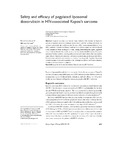Safety and efficacy of pegylated liposomal doxorubicin in HIV-associated Kaposi’s sarcoma

View/
Date
2009Author
Cainelli, F.
Vallone, A.
Publisher
Dove Medical Press Ltd. http://www.dovepress.com/biologics-targets--therapy-journalType
Published ArticleMetadata
Show full item recordAbstract
Kaposi’s sarcoma is a vascular tumor linked to the presence of Kaposi’s
sarcoma-associated herpesvirus (human herpesvirus-8) and the incidence of which has
increased considerably the world over after the onset of the human immunodeficiency virus
(HIV) pandemic. Antiretroviral therapy combined with cytotoxic agents has been established
as the treatment of choice in the past 10 years. Among chemotherapeutic agents, pegylated
liposomal doxorubicin has become the preferred one for patients with HIV-associated Kaposi’s
sarcoma in Western countries. The drug in this formulation localizes better to the tumor and has
higher efficacy. Skin toxicity, mucositis, and leukopenia/neutropenia are the main side effects.
Hepatotoxicity and mild cardiotoxicity are observed less frequently. Pegylated liposomal
doxorubicin impacts favorably on quality of life. Although cost effective in Western countries,
the drug is less so in developing countries.
